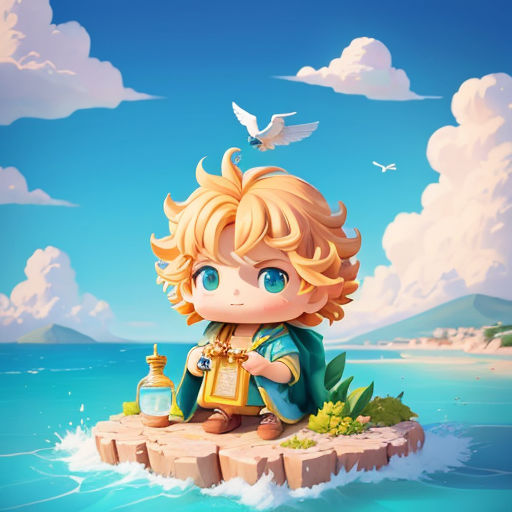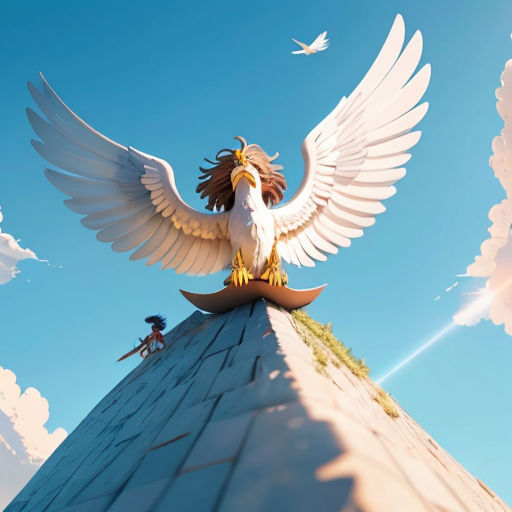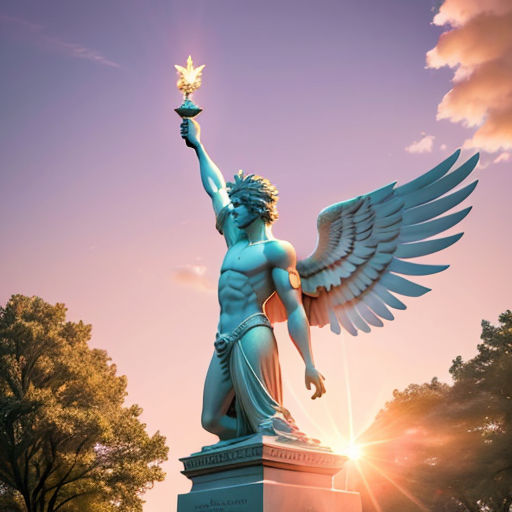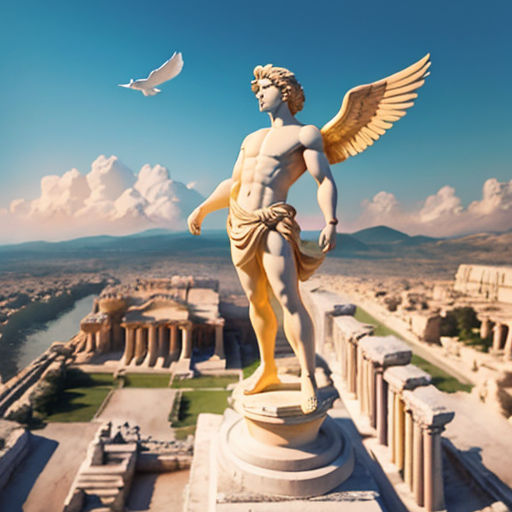
The Flying Man
By Storybird

10 Jun, 2023

Once upon a time, in a small village, there lived a young man named Icarus. He was a dreamer who always yearned to explore the skies and soar like a bird. However, he was stuck on the ground, unable to fulfill his desires.

One day, while strolling through the village, Icarus stumbled upon an old man who claimed he could create a magical potion that would enable humans to fly. The old man's name was Daedalus, a wise and experienced inventor. Without hesitation, Icarus requested that he make the potion for him.

Daedalus agreed to help Icarus, but warned him about the dangers of flying too high in the sky. If he went too close to the sun, the heat would be unbearable, and the potion's effects would wear off. Despite understanding the risks, Icarus was adamant about trying the potion.

After several days, Daedalus returned with a small vial of the mysterious flying potion. He handed it to Icarus, reminding him once again of the sun's dangers. With great excitement, the young man consumed the magical liquid and felt a sudden surge of energy coursing through his body.

Moments later, Icarus discovered that he had sprouted a pair of wings on his back. They were large and majestic, covered in soft white feathers. He was overjoyed at the sight of his new wings and couldn't wait to take to the skies.

Icarus bid farewell to Daedalus and launched himself into the air. As he soared upward, he marveled at the incredible feeling of flight. The wind carried him effortlessly, and he felt a sense of freedom like never before.

The villagers below watched in awe as Icarus soared above them. They had never seen anything like it, and word quickly spread throughout the village about the boy who could fly.

Icarus spent his days exploring the skies, feeling more alive than ever. He had become a local celebrity, and many people gathered each day to watch his aerial performances.

As the days went by, Icarus began to grow more confident in his flying abilities. He would perform daring maneuvers, swooping low and then skyrocketing back up into the sky. The villagers gasped in amazement at his skills, but Daedalus worried that his young friend was pushing the limits of the potion.

Icarus, however, paid no heed to Daedalus' concerns. He was captivated by the endless sky and wanted to explore even greater heights. He had heard tales of the sun's overwhelming heat but believed that he could handle it.

One fateful day, Icarus decided to venture higher than ever before. He soared upward, his wings carrying him closer and closer to the sun. From below, Daedalus watched in horror, knowing the dire consequences that awaited the young man.

As Icarus continued his ascent, the heat from the sun grew more intense. The air around him became scorching, and the feathers of his magnificent wings started to singe. He could sense the potion's effects wearing off, but his desire to reach the sun consumed him, and he pushed himself even higher.

Finally, it became too much for Icarus to bear. The magical potion's power was no match for the sun's intense heat, and his wings began to disintegrate. He felt a sudden weight on his back as the once-magnificent wings gave way to gravity.

Icarus fell from the sky, his once-powerful body now powerless to stop his descent. The villagers watched in horror as their beloved flying hero plummeted to the ground.

Daedalus rushed to Icarus' side, tears streaming down his face. He had warned the boy about the perils of flying too close to the sun, but Icarus hadn't heeded his warning. As he held the young man's lifeless body, the wise inventor knew this was a lesson that would never be forgotten.

The villagers mourned the tragic loss of Icarus and erected a monument in his honor. His story was passed down through generations, serving as a reminder of the dangers of reckless ambition and the importance of heeding wise counsel.

Daedalus, heartbroken over the loss of his dear friend, vowed to never create another flying potion. The skies, he believed, were a place for birds and not for humans. The tragedy of Icarus had taught him that some dreams, no matter how alluring, were best left unfulfilled.

As the years went by, the legacy of Icarus lived on in the hearts and minds of the villagers. They would often look up at the sky and remember the young man who soared with the birds but flew too close to the sun.

Parents told the tale of Icarus to their children, instilling in them the importance of moderation and the wisdom of listening to the advice of others. The tragic story became a cautionary tale, passed down from one generation to the next.

In time, the village grew into a bustling town, then a thriving city. New technologies were developed, and soon, humans could fly in machines called airplanes. But even as they took to the skies, the story of Icarus remained a constant reminder that there are limits to human ambition.

As the sun set on the city each day, the people would gather in the central park where Icarus' monument stood. They would remember the fearless young man who had achieved the impossible, but ultimately paid a terrible price for reaching too high.

The story of Icarus carried far beyond the city where it all began. It became a tale woven into the fabric of human history, a reminder of the consequences of not knowing one's limits. And so, through the ages, the legend of Icarus continued to be passed down, a testament to both the inspiring heights and tragic depths of human ambition.